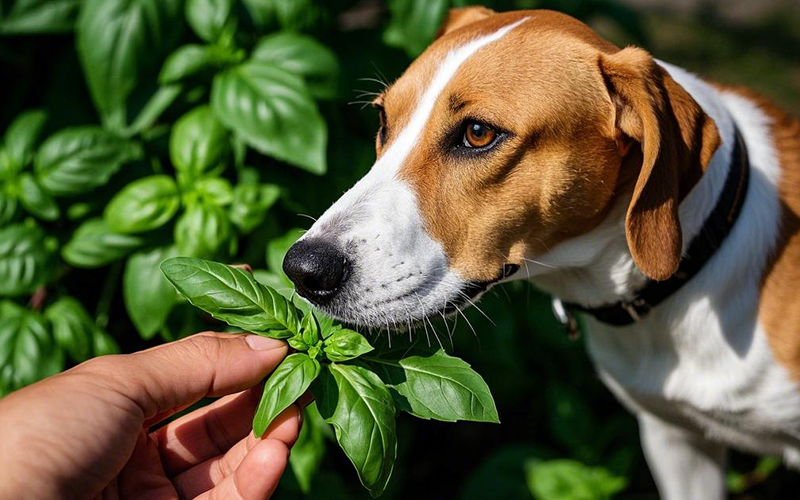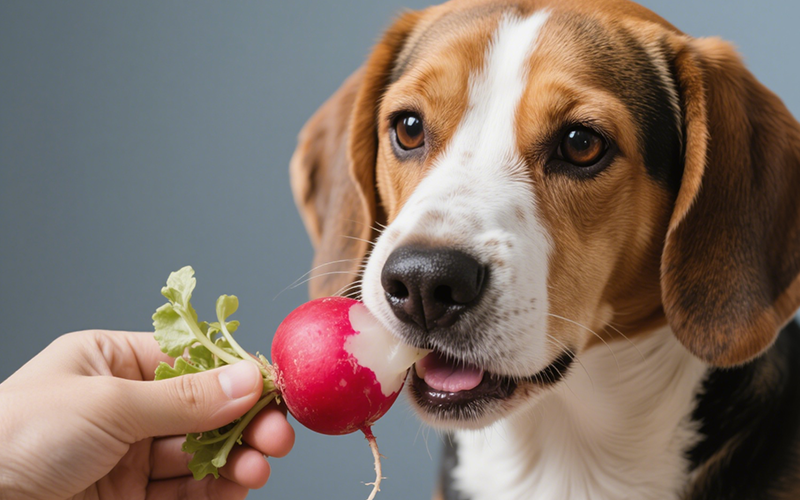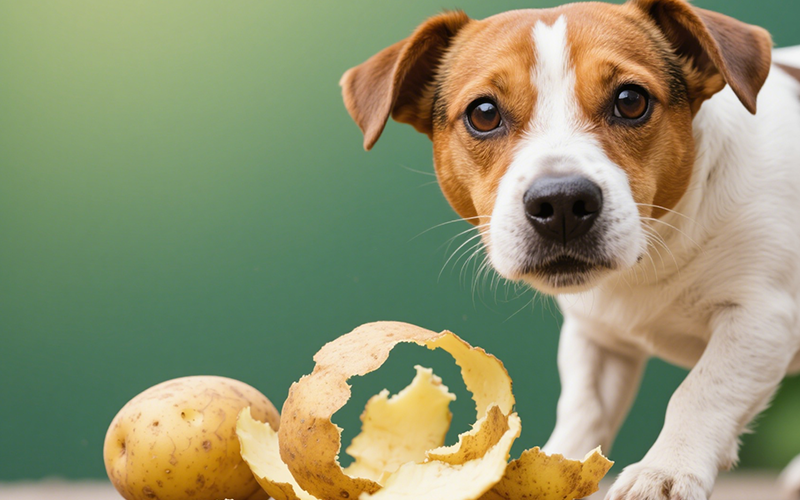Can Dogs Eat Basil? Here’s What You Need to Know
- 7 Mar 2025 10:20
Basil is a fragrant, flavorful herb often used in cooking, especially in Mediterranean and Italian dishes. But as a dog owner, you might wonder, can dogs eat basil? Is it safe, or should it be avoided? Let’s dive into the details and find out!

1. Is Basil Safe for Dogs? 🤔
The good news is that basil is generally safe for dogs when given in moderation. This herb can offer a few health benefits and add variety to your dog's diet. In fact, basil contains vitamins and minerals that can support your dog’s health, including vitamin K, calcium, iron, and antioxidants.
However, there are a few things you should keep in mind before adding basil to your dog’s diet.
2. Benefits of Basil for Dogs 🌱
When used properly, basil can be a great addition to your dog’s diet. Here are some potential health benefits:
2.1 Anti-inflammatory Properties 🩺
Basil is known for its anti-inflammatory properties. It contains compounds like eugenol that help reduce inflammation, which may be beneficial for dogs with conditions like arthritis.
2.2 Supports Digestive Health 💪
Basil has been traditionally used for its digestive benefits. It can help with gas, bloating, and indigestion. So, if your dog occasionally suffers from mild digestive upset, basil might be able to provide some relief.
2.3 Rich in Antioxidants 🍃
Basil is packed with antioxidants, which help combat free radicals and support your dog’s overall health. These antioxidants may help improve your dog’s immune system and protect cells from damage.
2.4 Freshens Breath 😁
A benefit many dog owners love is basil's ability to freshen your dog’s breath. Adding small amounts of fresh basil to your dog’s diet may help reduce bad breath, especially if it’s caused by digestive issues.
3. Potential Risks of Basil for Dogs ⚠️
Although basil is safe in moderation, there are some risks to be aware of:
3.1 Allergic Reactions 🌿😨
Just like with any new food, some dogs may develop an allergic reaction to basil. If your dog has never eaten basil before, start by offering a very small amount and watch for any signs of an allergic reaction, such as itchiness, redness, or swelling. If you notice any symptoms, stop feeding basil and consult a professional.
3.2 Overfeeding Can Cause Upset Stomach 💩
Too much basil can lead to digestive issues like an upset stomach or diarrhea. This is because basil contains certain compounds that can be harsh on a dog’s digestive system in large quantities. Always serve basil in small amounts to avoid overloading your dog’s system with fiber and essential oils.
3.3 Potential Toxicity from Certain Forms ⚠️
Basil oil or essential oils should never be fed to dogs, as they are much more concentrated and can be toxic. Only fresh or dried basil leaves should be offered. Always ensure the form you give your dog is safe and suitable for consumption.
4. How to Safely Feed Basil to Dogs 🐶
If you want to share some basil with your dog, here’s how to do it safely:
4.1 Moderation is Key ⚖️
As with any new food, moderation is important. Start by giving your dog a very small amount of basil (like a leaf or two) to see how they react. If they tolerate it well, you can gradually increase the amount.
4.2 Add It to Their Meals 🍽️
One of the easiest ways to incorporate basil into your dog’s diet is by adding finely chopped fresh basil to their regular meals. It pairs nicely with meat, rice, or even plain vegetables.
4.3 Avoid Basil with Spices or Sauces 🌶️
If you’re cooking with basil, avoid giving your dog any food that’s mixed with spices or sauces that may be harmful to dogs. Garlic, onion, and spicy seasonings can be toxic to dogs and should never be given.
5. What About Basil from the Garden? 🌿🏡
If you grow basil at home, you might be tempted to offer your dog some fresh leaves straight from the garden. Fresh basil from the garden is generally safe, as long as you haven’t used any harmful chemicals like pesticides or herbicides on your plants. Always wash the basil thoroughly before offering it to your dog.
If your dog tends to help themselves to plants in your garden, ensure that your basil is free from any chemicals that could harm them.
6. Alternatives to Basil for Dogs 🍖🍏
While basil is safe in moderation, there are many other dog-safe herbs and foods you can offer as healthy treats:
Parsley 🌿: Known for freshening your dog's breath and promoting digestion.
Carrots 🥕: Low in calories and high in fiber, perfect for a crunchy snack.
Pumpkin 🎃: Great for digestion and full of vitamins and fiber.
Sweet Potatoes 🍠: Rich in vitamins and antioxidants, and safe for dogs when cooked properly.
Chicken 🍗: A protein-packed treat that most dogs love.
Mixing and matching these healthy treats can provide your dog with a variety of flavors and nutrients.
7. What to Do If Your Dog Eats Too Much Basil ❓
If your dog happens to eat a large amount of basil or shows any signs of illness, don’t panic. The best course of action is to monitor your dog closely for any signs of discomfort, such as vomiting, diarrhea, or lethargy. If your dog seems to be having difficulty, it's a good idea to contact a pet health assistant like PettureX. This pet AI software offers 24/7 consultations and can provide instant advice on how to handle potential issues with your dog’s health.
PettureX even offers pet image recognition to help assess your dog’s condition and ensure you’re taking the right steps.
Conclusion: Can Dogs Eat Basil? 🌱🐕
In conclusion, yes, dogs can eat basil, but it’s important to do so in moderation and with care. While fresh basil offers some potential health benefits, it’s essential to be cautious about the quantity and the form in which you give it. Basil should only be served fresh or dried, not as basil oil or essential oils, which can be harmful.
For a healthier snack, you can try offering your dog a variety of other dog-safe fruits, vegetables, and herbs. Always consult PettureX for quick answers and assistance with any concerns about your dog’s diet and health.
By taking a few simple precautions, you can safely add a little basil to your dog’s diet and enjoy its benefits without worry! 🌿🐕
Related

Radish Bites for Your Buddy? A Vet-Reviewed Guide on Whether Dogs Can Eat Radishes
- 22 Apr 2025
Potato Peels for Pooches? Unpeeling the Risks and Facts for Dog Owners
- 22 Apr 2025
Crunchy Curiosity: Can Dogs Safely Snack on Pork Rinds? A Deep Dive
- 21 Apr 2025
Pomegranate Seeds and Pooches: A Deep Dive into Whether Dogs Can Safely Indulge
- 21 Apr 2025
Can Dogs Eat Peaches? Vet Explains Benefits, Cyanide Risks & Safe Serving
- 16 Apr 2025
Can Dogs Eat Mulberries? Vet Explains Safety, Benefits & Potential Risks
- 16 Apr 2025
Can Dogs Eat Mozzarella? Vet Explains the Cheesy Truth (Risks & Benefits)
- 16 Apr 2025
Can Dogs Eat Maple Syrup? The Sugary Truth & Why Vets Advise Against It
- 16 Apr 2025
Can Dogs Eat Mango Skin? Vet Explains Why It's a Risky Chew!
- 16 Apr 2025
Can Dogs Eat Mac n Cheese? Vet Explains Why This Comfort Food Is Unsafe!
- 16 Apr 2025
